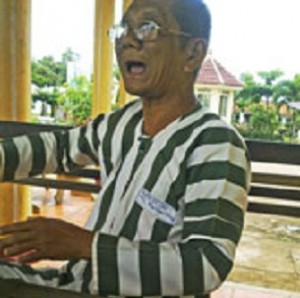
Nguyen Huu Cau in a cell phone photo taken at the Xuan Loc prison in Dong Nai on June 4, 2013 by his granddaughter Tran Phan Yen Nhi during her first meeting with him.
Photo courtesy of Tran Phan Yen Nhi’s family
2013-07-16 | Reported by An Nguyen for RFA’s Vietnamese Service. Written in English by Rachel Vandenbrink.
The son of one of Vietnam’s longest-serving political prisoners, Nguyen Huu Cau, who is in weak health, has warned that his father could die in prison as a new petition was sent to President Truong San seeking his freedom.
“He will not be able to live much longer in prison,” Tran Ngoc Bich told RFA’s Vietnamese Service as the medical condition of Cau, 67, who is serving a life sentence for “sabotage” over his writings, deteriorated.

An undated photo of Nguyen Huu Cau’s granddaughter Tran Phan Yen Nhi. Photo courtesy of Tran Phan Yen Nhi’s family.
Cau, who is at the ZA30 Xuan Loc prison in southern Vietnam’s Dong Nai province, has lost most of his vision and hearing, has heart trouble, has lost all but one of his teeth, suffers from gastritis, and faints frequently, according to relatives who have visited him at the facility.
Relatives have said his condition is the result of harsh detention conditions over his more than 30 years in prison and raised concerns about inadequate medical care at Xuan Loc, which is one of the country’s main facilities for political prisoners.
Bich’s daughter, 14-year-old Tran Phan Yen Nhi, wrote a petition to President Truong San calling for her grandfather’s release after meeting him for the first time when her family visited him at the prison on June 4. Some 500 petitions have been sent to the authorities so far seeking Cau’s release.
“Our brief, 30-minute meeting was not enough for me to understand what he has endured over the past 37 years in prison,” she said of their meeting in the letter addressed to Truong San and posted online this month.
She asked to be granted the wish of “being reunited with my grandfather in the near future.”
She added that her family and supporters had waited in vain for responses to hundreds of petitions to the authorities over Cau’s case over the years and requested that her letter “not be trashed like the other 500.”
‘Grave concerns’
Cau, a poet and musician who was once a soldier in the South Vietnamese army, has been imprisoned since 1982, and before that spent five years in a re-education through labor camp.
He was sentenced to death in 1983 over an “incriminating” manuscript of songs and poems that implicated members of the ruling Communist Party in corruption and his case has prompted international attention and calls for his release.
Earlier this month, English PEN, the U.K. branch of a writers’ association that advocates for freedom of expression worldwide, issued a call to action urging Cau’s “immediate and unconditional release on humanitarian grounds.”
“There are grave concerns that Nguyen Huu Cau, who has already been separated from his family for more than three decades, may die in prison,” the group said.
The group’s global wing, PEN International, said in March that it was “seriously concerned” about Cau’s health and that he was being denied adequate medical care in prison.
‘Very sick’
Relatives say Cau’s condition has worsened in recent months after he had already been in poor health for years.
Dissident journalist Truong Minh Duc, who spent two years in the same prison as Cau between 2008 and 2010, said that during that time the poet had been “very sick.”
“He was in prison for too long, and he has a lot of serious illnesses,” he said in an interview with RFA.
Duc added that if Cau does die at Xuan Loc he will not be the first dissident to perish in the prison, which is known by rights groups for its harsh regimes for political prisoners and last month was the site of a riot by inmates demanding better conditions.
Duc added that Cau had been kept separately from other political inmates, and that he had heard from other prisoners that Cau had at one time been held in solitary confinement.
“One man said Cau was kept in a separate area and no one could talk to him,” he said.
[subscribe2]
Height Insoles: Hi, I do believe this is an excellent site. I stumbledupon …
http://fishinglovers.net: Appreciate you sharing, great post.Thanks Again. Keep writi…
Achilles Pain causes: Every weekend i used to pay a quick visit this site, as i w…






July 19, 2013
Fresh Appeal for Long-Serving Vietnamese Political Prisoner’s Release
by Defend the Defenders • Nguyen Huu Cau, Truong Minh Duc
Nguyen Huu Cau in a cell phone photo taken at the Xuan Loc prison in Dong Nai on June 4, 2013 by his granddaughter Tran Phan Yen Nhi during her first meeting with him.
Photo courtesy of Tran Phan Yen Nhi’s family
2013-07-16 | Reported by An Nguyen for RFA’s Vietnamese Service. Written in English by Rachel Vandenbrink.
The son of one of Vietnam’s longest-serving political prisoners, Nguyen Huu Cau, who is in weak health, has warned that his father could die in prison as a new petition was sent to President Truong San seeking his freedom.
“He will not be able to live much longer in prison,” Tran Ngoc Bich told RFA’s Vietnamese Service as the medical condition of Cau, 67, who is serving a life sentence for “sabotage” over his writings, deteriorated.
An undated photo of Nguyen Huu Cau’s granddaughter Tran Phan Yen Nhi. Photo courtesy of Tran Phan Yen Nhi’s family.
Cau, who is at the ZA30 Xuan Loc prison in southern Vietnam’s Dong Nai province, has lost most of his vision and hearing, has heart trouble, has lost all but one of his teeth, suffers from gastritis, and faints frequently, according to relatives who have visited him at the facility.
Relatives have said his condition is the result of harsh detention conditions over his more than 30 years in prison and raised concerns about inadequate medical care at Xuan Loc, which is one of the country’s main facilities for political prisoners.
Bich’s daughter, 14-year-old Tran Phan Yen Nhi, wrote a petition to President Truong San calling for her grandfather’s release after meeting him for the first time when her family visited him at the prison on June 4. Some 500 petitions have been sent to the authorities so far seeking Cau’s release.
“Our brief, 30-minute meeting was not enough for me to understand what he has endured over the past 37 years in prison,” she said of their meeting in the letter addressed to Truong San and posted online this month.
She asked to be granted the wish of “being reunited with my grandfather in the near future.”
She added that her family and supporters had waited in vain for responses to hundreds of petitions to the authorities over Cau’s case over the years and requested that her letter “not be trashed like the other 500.”
‘Grave concerns’
Cau, a poet and musician who was once a soldier in the South Vietnamese army, has been imprisoned since 1982, and before that spent five years in a re-education through labor camp.
He was sentenced to death in 1983 over an “incriminating” manuscript of songs and poems that implicated members of the ruling Communist Party in corruption and his case has prompted international attention and calls for his release.
Earlier this month, English PEN, the U.K. branch of a writers’ association that advocates for freedom of expression worldwide, issued a call to action urging Cau’s “immediate and unconditional release on humanitarian grounds.”
“There are grave concerns that Nguyen Huu Cau, who has already been separated from his family for more than three decades, may die in prison,” the group said.
The group’s global wing, PEN International, said in March that it was “seriously concerned” about Cau’s health and that he was being denied adequate medical care in prison.
‘Very sick’
Relatives say Cau’s condition has worsened in recent months after he had already been in poor health for years.
Dissident journalist Truong Minh Duc, who spent two years in the same prison as Cau between 2008 and 2010, said that during that time the poet had been “very sick.”
“He was in prison for too long, and he has a lot of serious illnesses,” he said in an interview with RFA.
Duc added that if Cau does die at Xuan Loc he will not be the first dissident to perish in the prison, which is known by rights groups for its harsh regimes for political prisoners and last month was the site of a riot by inmates demanding better conditions.
Duc added that Cau had been kept separately from other political inmates, and that he had heard from other prisoners that Cau had at one time been held in solitary confinement.
“One man said Cau was kept in a separate area and no one could talk to him,” he said.
[subscribe2]